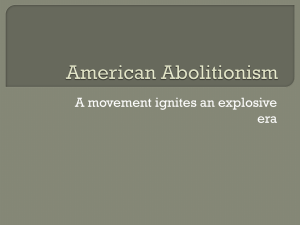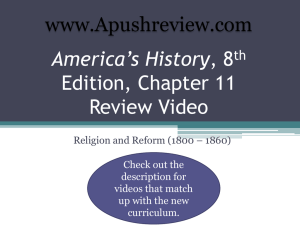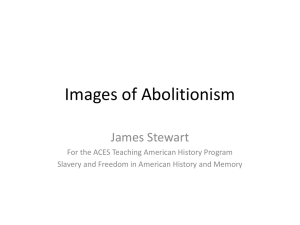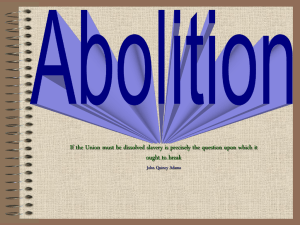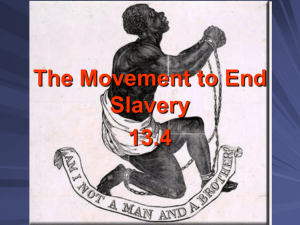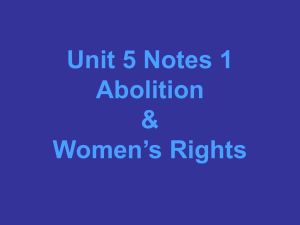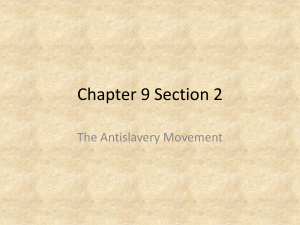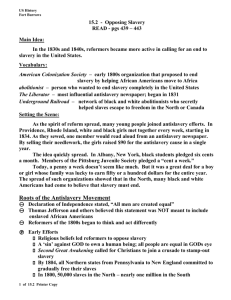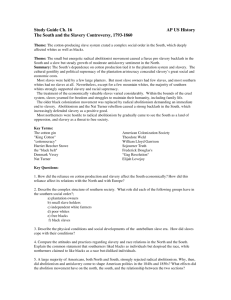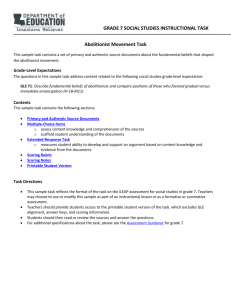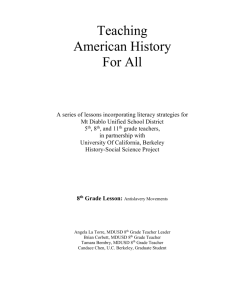Vocab 17 - Abolitionism - Guthrie Public Schools
advertisement
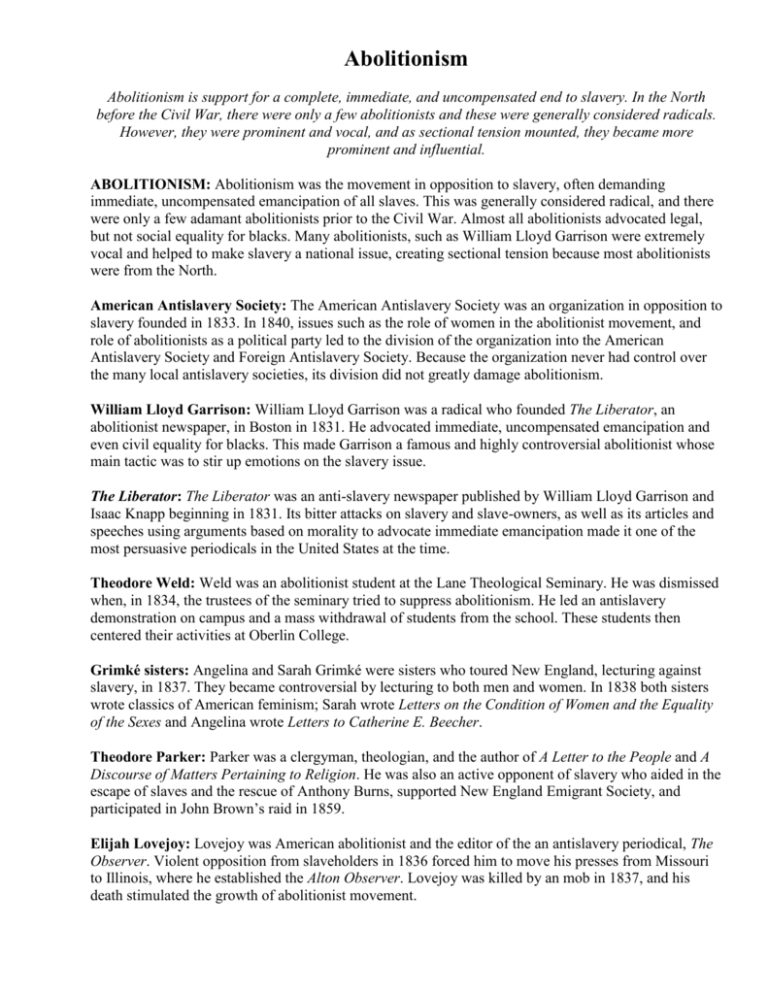
Abolitionism Abolitionism is support for a complete, immediate, and uncompensated end to slavery. In the North before the Civil War, there were only a few abolitionists and these were generally considered radicals. However, they were prominent and vocal, and as sectional tension mounted, they became more prominent and influential. ABOLITIONISM: Abolitionism was the movement in opposition to slavery, often demanding immediate, uncompensated emancipation of all slaves. This was generally considered radical, and there were only a few adamant abolitionists prior to the Civil War. Almost all abolitionists advocated legal, but not social equality for blacks. Many abolitionists, such as William Lloyd Garrison were extremely vocal and helped to make slavery a national issue, creating sectional tension because most abolitionists were from the North. American Antislavery Society: The American Antislavery Society was an organization in opposition to slavery founded in 1833. In 1840, issues such as the role of women in the abolitionist movement, and role of abolitionists as a political party led to the division of the organization into the American Antislavery Society and Foreign Antislavery Society. Because the organization never had control over the many local antislavery societies, its division did not greatly damage abolitionism. William Lloyd Garrison: William Lloyd Garrison was a radical who founded The Liberator, an abolitionist newspaper, in Boston in 1831. He advocated immediate, uncompensated emancipation and even civil equality for blacks. This made Garrison a famous and highly controversial abolitionist whose main tactic was to stir up emotions on the slavery issue. The Liberator: The Liberator was an anti-slavery newspaper published by William Lloyd Garrison and Isaac Knapp beginning in 1831. Its bitter attacks on slavery and slave-owners, as well as its articles and speeches using arguments based on morality to advocate immediate emancipation made it one of the most persuasive periodicals in the United States at the time. Theodore Weld: Weld was an abolitionist student at the Lane Theological Seminary. He was dismissed when, in 1834, the trustees of the seminary tried to suppress abolitionism. He led an antislavery demonstration on campus and a mass withdrawal of students from the school. These students then centered their activities at Oberlin College. Grimké sisters: Angelina and Sarah Grimké were sisters who toured New England, lecturing against slavery, in 1837. They became controversial by lecturing to both men and women. In 1838 both sisters wrote classics of American feminism; Sarah wrote Letters on the Condition of Women and the Equality of the Sexes and Angelina wrote Letters to Catherine E. Beecher. Theodore Parker: Parker was a clergyman, theologian, and the author of A Letter to the People and A Discourse of Matters Pertaining to Religion. He was also an active opponent of slavery who aided in the escape of slaves and the rescue of Anthony Burns, supported New England Emigrant Society, and participated in John Brown’s raid in 1859. Elijah Lovejoy: Lovejoy was American abolitionist and the editor of the an antislavery periodical, The Observer. Violent opposition from slaveholders in 1836 forced him to move his presses from Missouri to Illinois, where he established the Alton Observer. Lovejoy was killed by an mob in 1837, and his death stimulated the growth of abolitionist movement. Wendell Phillips: Phillips was an American orator, abolitionist, and reformer. He also spoke publicly in favor of women’s rights, temperance, abolition and elimination of capital punishment. His most famous speech, The Murder of Lovejoy speech protested the murder of Elijah Lovejoy and gained him recognition from the public. •NAT TURNER’S INSURRECTION: Turner was a slave who became convinced that he was chosen by God to lead his people to freedom. In Virginia in 1831, Turner led about 70 blacks into a revolt against their masters. Before the uprising was brought to a halt by white militiamen, 55 whites were killed by Turner and his followers and many blacks were lynched by white mobs. Turner and fifteen of his companions were hanged. The rebellion convinced white southerners that a successful slave insurrection was an constant threat.. Gabriel Prosser: Prosser a Virginia slave who planned a slave uprising in 1800 with the intent of creating a free black state. They intended to seize the federal arsenal at Richmond, but the plan was betrayed by other slaves. Prosser and his comrades were captured by the state militia and executed. Denmark Vesey: Vessy was a slave from South Carolina who bought his freedom with $1,500 that he won in a lottery. In 1822, he planned to lead a group of slaves in an attacking Charleston and stealing the city’s arms. However, the plan was betrayed by other slaves, resulting in the hanging of Vessy and his followers. David Walker, Walker’s Appeal: David Walker was a free black from Boston who published his Appeal in 1829, advocating a black rebellion to crush slavery. The purpose of Walker’s Appeal was to remind his people that they were Americans and should be treated fairly. Frederick Douglass: Douglass was an escaped slave, who became a powerful abolitionist orator. He captured his audiences with descriptions of his life as a slave. He also published a newspaper, the North Star, in the early 1830s. Douglass’ influential speeches encouraged slaves to escape as he did and motivated northerners to oppose slavery. Sojourner Truth: Sojourner Truth was a runaway slave who became an influential figure in both women’s societies and the abolitionist movement. In spite of her illiteracy, she traveled widely through New England and the Midwest, making eloquent speeches against sex discrimination, Godlessness, and slavery which attracted large audiences. Harriet Tubman: Tubman was a black woman who, after escaping from slavery in 1849, made 19 journeys back into the South to help as many as 300 other slaves escape. She was the most famous leader of the underground railroad. Because of her efforts to lead her people to freedom, Tubman was known as "Moses" among blacks. underground railroad: The underground railroad was a secret network of antislavery northerners who illegally helped fugitive slaves escape to free states or Canada during the period before the American Civil War. The system had no formal organization, but it helped thousands of slaves escape and contributed to the hostility between the North and South. Creole affair: The Creole Affair was an uprising by a group of slaves who were in the process of being transported in the ship, the Creole. They killed the captain, took control of ship and sailed for Bahamas, where they became free under British. Incidents such as this contributed to the intensification of sectional conflict in the United States.


